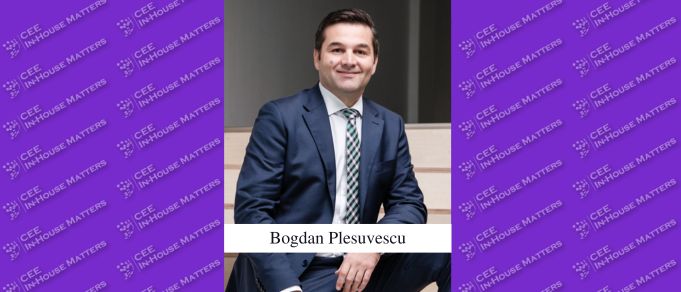Bogdan Plesuvescu has worked in both Moldova and Romania’s banking sectors, progressing from a legal role at Banca Transilvania to CEO of Viktoriabank to Deputy CEO back at the “mother organization.”
CEELM: Tell us a bit about yourself and your career path leading up to your current role.
Plesuvescu: In 2003, I started my career in the banking sector as the deputy legal manager at a bank in Romania, which was owned by Turkish shareholders. Joining this institution marked the beginning of what I consider to be the ideal start to my professional journey. The experience presented numerous challenges and abundant opportunities for learning, particularly in the realms of negotiation and retail banking. My tenure at Credit Europe Bank significantly influenced my future career trajectory, for which I hold immense gratitude.
Transitioning to a prominent international organization provided me with invaluable insights into the dynamics of global banking operations. Working across various jurisdictions broadened my perspective and facilitated extensive networking opportunities. Moreover, my involvement in addressing competition council issues locally, coupled with knowledge exchange sessions in London, equipped me with indispensable expertise in navigating such regulatory landscapes.
Subsequently, at ABN Amro Bank, I assumed broader responsibilities beyond legal matters, encompassing collections and turnaround initiatives within the banking sector. This transition culminated in my elevation to the role of vice president at Finansbank Romania Bank, marking a significant milestone in my career progression.
In 2013, I joined the Banca Transilvania group, assuming the role of Legal Director and overseeing the workout and collection departments. Notably, the period coincided with the group’s active involvement in several pivotal acquisitions, including Volksbank (2016), Bancpost – EFG Group (2018), and Victoriabank (2018) in the Republic of Moldova. These acquisitions propelled the bank’s market presence, presenting multifaceted challenges and opportunities for growth.
Following the successful acquisition of Victoriabank in Moldova in 2018, I was appointed as its CEO, embarking on a transformative journey aimed at enhancing corporate governance and fostering sustainable growth. Over the ensuing five years, amidst formidable challenges such as the COVID-19 crisis and regional geopolitical tensions, our concerted efforts resulted in the bank’s remarkable evolution into a high-performing institution with robust governance frameworks.
My subsequent role as deputy CEO at Banca Transilvania, commencing last year, signifies a return to the mother organization, albeit with expanded responsibilities encompassing group subsidiaries coordination in addition to legal, workout, and collection. Noteworthy engagements include my participation in an M&A project within Moldova where Victoriabank acquired BCR Moldova (part of Erste Group) in 2022 and the recent acquisition of OTP Bank in Romania, underscoring the group’s strategic expansion initiatives.
As I navigate my current role, based in Romania, I am committed to leveraging my diverse expertise to drive sustainable growth and foster excellence across Banca Transilvania’s diverse business domains.
CEELM: What were the main elements that led you from the position of a legal advisor to a management position?
Plesuvescu: I believe that skills, primarily determination, focus, and problem-solving abilities, are crucial in navigating challenges and fulfilling roles effectively. In the realm of in-house legal work, it’s often perceived that lawyers merely interpret the law without offering practical solutions. However, in reality, in-house lawyers adopt a pragmatic approach to problem-solving, patiently listening and strategizing to mitigate risks. Throughout my career, I strived to broaden my expertise beyond legal matters, engaging in activities such as workouts and leadership. This diversified skill set underscores the notion that even an in-house lawyer can ascend to the role of CEO, demonstrating that there are no inherent limitations in career progression.
CEELM: During your tenure, what would you describe to be the most intense period?
Plesuvescu: In Moldova, one of the most pressing challenges arose during the COVID-19 period. Initially, our organization operated entirely from the office, relying solely on paper documents without any electronic archives. However, from March 15 to April 1, we faced the task of transitioning to a work-from-home setup. This transformation was particularly daunting, given that we lacked laptops and relied solely on desktop computers. Within a short span, we had to procure nearly 800 laptops, establish VPN connections, and implement stringent security measures. This demanded significant resources, both financial and human, to accomplish within a two-week timeframe.
This experience prepared us for the subsequent challenge triggered by the outbreak of war in Ukraine. Overnight, we were confronted with a surge of refugees seeking assistance, including access to financial services. Additionally, our own staff expressed concerns about relocating their families to safer jurisdictions, considering Moldova’s non-membership to the EU. To address these concerns, we developed a comprehensive program aimed at providing support and reassurance to our team members. We assured them that, in the event of any adverse situation, we would prioritize their safety and facilitate necessary arrangements, including backup plans for relocation to Romania if needed. Despite the uncertainties, none of our team members chose to relocate with their families, signaling their trust and commitment to the organization.
CEELM: How large is your in-house team currently, and how do you decide if you will outsource a project?
Plesuvescu: Banca Transilvania is the largest bank in Romania, with a comprehensive presence covering retail, SMEs, and corporate sectors, boasting over 500 branches nationwide. Our operational model relies heavily on an in-house legal team, comprising nearly 100 professionals stationed at headquarters. These in-house lawyers handle day-to-day activities encompassing retail, SME, litigation, corporate governance, and regulatory compliance. Our preference for an extensive in-house team stems from the desire to maintain control and expertise internally rather than outsourcing.
However, for specialized projects such as M&A transactions, we collaborate with external legal experts. This strategic decision to outsource arises when additional expertise is required, particularly for transactions involving specific industries. We establish partnerships with external lawyers to complement our internal capabilities and ensure the success of these projects. Similarly, in cases of heightened litigation risk, we engage external legal support to augment our in-house team’s capabilities.
Selecting external legal partners is a meticulous process, heavily reliant on established trust and prior relationships. Once engaged, the continuity of working relationships proves beneficial, as familiarity with our organizational structure and demands streamline collaboration. Despite our stringent requirements and tight court filing deadlines, we maintain high standards for external legal partners, choosing from a select group of trusted professionals with proven track records.
CEELM: What has been keeping you and your in-house team busy over the last 12 months? What about the upcoming 12 months? What are you keeping on your radar that you think will impact your workload the most?
Plesuvescu: Digitalization, particularly in the realm of AI, is increasingly prevalent within the banking sector. Discussions encompass various areas, emphasizing the need to enhance automation not only in legal tasks but across all banking activities. This shift presents numerous challenges, requiring the development of new skills within the legal domain. Legal aspects of automation and digitalization demand thorough documentation, up-to-date knowledge of legislative changes, and the implementation of best practices. Managing these aspects keeps us extensively engaged, both in accumulating knowledge and integrating AI-driven tools and systems into our in-house operations.
Internally, there are ongoing debates regarding the potential for AI to replace the work of in-house lawyers. However, my stance is that we should embrace technological advancements rather than fear them. The focus should shift toward exploring how lawyers can collaborate with AI to enhance productivity and streamline legal processes. Instead of viewing AI as a threat, we should seek ways to leverage it to improve efficiency and clarity in legal work.
This article was originally published in Issue 11.5 of the CEE Legal Matters Magazine. If you would like to receive a hard copy of the magazine, you can subscribe here.


